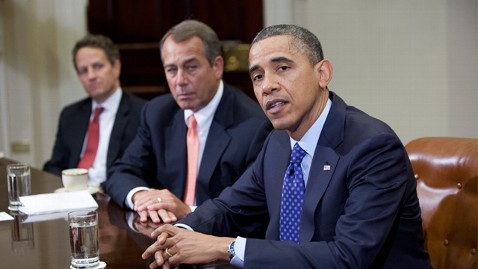At a sprawling 25,000-square-foot factory outside Dayton, Ohio, David Curliss manufactures high-tech composite fibers, structural adhesives and special sealants known as syntactic foams. The small business he founded a decade ago has grown steadily since the recession, employing 21 workers on several production lines.
But now, with a tax hike on the horizon as part of a deficit-reduction deal as evisioned by President Obama and the Democrats, it may become more difficult to expand his business and hire, Curliss says.
"What it absolutely means is less cash for growth in my business," he told ABC News. "In the worst-case scenario, it means we let someone go or have to reduce benefits."
Curliss is among an estimated 940,000 Americans who will report more than $200,000 in business income on their individual tax returns in 2013 and pay at the top marginal rates, according to the bipartisan Joint Committee on Taxation.
They are now at the center of the political storm over the "fiscal cliff" and debate on whether to raise top income tax rates at the end of the year.
Obama wants the two upper tax brackets to rise from 33 and 35 percent to 36 and 39.6 percent, respectively. Republicans staunchly oppose any increase, largely citing the impact on companies like Curliss'.
Performance Polymer Solutions, like thousands of small businesses, is structured as a so-called "pass-through" entity with the firm's income and profits passed directly to Curliss for reporting on his 1040. The company itself does not pay taxes.
On paper, the extra cash makes Curliss look like a rich man, subjecting his income to the top rates. Yet, he never actually sees the business income in his paycheck, he says. Instead, the money is kept inside the business to help it grow.
"Raising the top rates means there will be less cash in my company to reinvest in employees and benefits and equipment," he said.
Democrats, defending the need for revenue from the top 2 percent of U.S. income earners to help close the budget gap, say cases like Curliss' are the exception not the rule.
"Ninety-seven percent of small businesses would not see any increases in their income taxes," Obama said Thursday. "And even folks who make more than $250,000 would still have a tax break for their incomes up to $250,000."
Just 3 percent of more than 30 million Americans who report business income on their personal returns next year will pay at the top marginal rates, the Joint Committee found.
Many of them, colloquially referred to as "business owners," include independent doctors, lawyers and hedge fund managers whose companies are set up as "pass-through" entities with high incomes and few employees.
Experts say the vast majority of businesses paying taxes through the individual code are very small, make very little money and don't come remotely close to having to pay higher taxes if Obama gets his way.
The average income of a business that reports on an individual tax return is about $40,000, according to the Tax Policy Center.
"Most of these are sole proprietorships and their number of employees is zero," said Howard Gleckman, an analyst with the Center, noting that self-employed taxpayers include babysitters, plumbers and investors.
"All things equal, the lower the taxes, the better off we all are," Gleckman said. "The trade-off, though, is that if you believe the budget deficit is a big economic problem, and if you believe that the ultimate consequence of ongoing high deficits is higher interest rates, well then that's a cost, too."



















